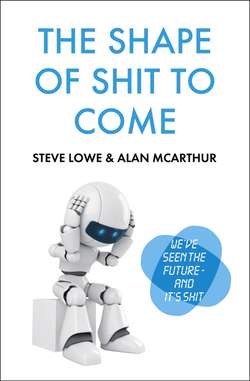Читать книгу The Shape of Shit to Come - Steve Lowe - Страница 7
We want to help you overcome your genes
ОглавлениеMany are calling the twenty-first century the century of biology. Mainly it’s the biologists calling it that. But they do have a point. The century began with a bang, biologically speaking, with the rough completion of the Human Genome Project (HGP) – ‘biology’s Apollo landing’ – in 2000. Large-scale messing with your actual humans at a genetic level came one huge step closer with the mapping of the human genome (all the genetic info in a person), aka the Road Atlas of Man.
It was a hell of a thing. Even just reading out the entire code (some 3 billion DNA base pairs, or 23,000 genes) would take about twelve years – so don’t do that. This achievement was announced with great fanfare by then US-president Bill Clinton, a fervent supporter of the efforts – and he had more to fear from genetics than most, having totalled his presidency by spilling some seed on an intern’s dress. ‘We are learning the language in which God created Life,’ he said. (About the HGP, not while he was getting off with Monica Lewinsky.) (Although maybe then too.)
So what have we learnt? We already know that cauliflowers contain more genes than humans. So having lots of genes isn’t everything; no one is claiming cauliflowers have anything approaching human consciousness (there is nothing cruel about cauliflower cheese). But mainly what we have learnt is that we still have much to learn. We have mapped the human genome, but we don’t know how most of it works. We are trying to find the secrets written in the DNA. It’s like runes, man.
The HGP cost $3bn, which is a lot of money. But the costs are rapidly falling for having your own genetic code sequenced (it currently costs over £2,000). So you are now able to have a much better idea of how you will die (cancer, Hodgkinson’s, Parkinson’s …). So that’s nice. But then, there is also the prospect of targeted medicine. As the price of mapping genes comes down, you could get drugs optimised for your particularities (people respond to drugs differently); so-called pharmacogenetics. You could even treat an illness before you get it. Treating diseases you don’t yet have – it’s the future.
Mapping everyone’s genome raises questions of privacy, of course, and who gets access to the info. For employers, genetic discrimination could become a new type of discrimination to replace some of the old ones, like skin colour. Or the insurance industry could refuse to insure those at genetic risk. And it goes without saying the world should always applaud any new opportunities for the insurance industry to turn a profit; they are our friends.
Clearly some genes have particular purposes – like the ones that make mice horny. Scientists are keen to work out what the various human genes do, and claim to have isolated numerous genes which supposedly make up our personalities, including the gluttony gene, the long-life gene, the psychopath gene, the susceptible-to-flu gene, the genius gene, the infidelity gene, the suicide gene and even the liberal gene. Imagine having all of those. It would be one hell of a ride, albeit ultimately tragic.1
These efforts bring the fear that we will not just muss with genes to banish illness, but to positively engineer in boosts to intelligence or looks, or even personality types. Designer babies could be created by gene therapy – inserting genes into the cells of an embryo – encouraging or discouraging certain predispositions. This might be used to phase out cancer, or it might be used to phase out liberals.
Anyone trying to do either will face difficulties. Genes, unsurprisingly enough, work together in ways of fiendish complexity. Boosting up one seemingly positive gene might cause some unwanted side-effects; the Cleveland supermice were great lovers, yes, but were also highly aggressive. ‘Why this is the case, we are not really sure,’ admitted Professor Hanson.
But for some, the potential profits are unignorable. In 2009, a Los Angeles clinic – LA Fertility Institutes – run by controversial IVF pioneer Dr Jeff Steinberg, offered would-be parents the chance to select their kid’s hair and eye colours – making sure to offer no money back guarantee. ‘I would not say this is a dangerous road,’ Dr Steinberg said. ‘It’s an uncharted road.’
But a road that is uncharted is, by definition, a dangerous road because it is uncharted. You do not know whether it is a safe road or one that is beset by marauding blonde-haired superchildren who see you as a source of cheap fuel. That’s the main worry here. And one that saw public opinion force Steinberg to, at least temporarily, withdraw the service. We weren’t ready for the master race quite yet.
Strange about the Cleveland mice, though: you’d have thought a mouse that was getting it that often would be pretty relaxed. But that’s genetic complexity for you.
